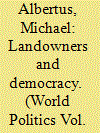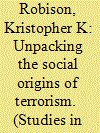| Srl | Item |
| 1 |
ID:
152233


|
|
|
|
|
| Summary/Abstract |
Are large landowners, especially those engaged in labor-dependent agriculture, detrimental to democratization and the subsequent survival of democracy? This assumption is at the heart of both canonical and recent influential work on regime transition and durability. Using an original panel data set on the extent of labor-dependent agriculture in countries across the world since 1930, the author finds that labor-dependent agriculture was indeed historically bad for democratic stability and stunted the extension of suffrage, parliamentary independence, and free and fair elections. However, the negative influence of labor-dependent agriculture on democracy started to turn positive around the time of democracy's third wave. The dual threats of land reform and costly domestic insurgencies in that period—often with more potent consequences under dictators—plausibly prompted landowners to push for democracy with strong horizontal constraints and favorable institutions that could protect their property more reliably over the long term than could dictatorship. The shift in support for democracy by labor-dependent landowners is a major untold story of democracy's third wave and helps explain the persistent democratic deficit in many new democracies.
|
|
|
|
|
|
|
|
|
|
|
|
|
|
|
|
| 2 |
ID:
104340


|
|
|
|
|
| Publication |
2011.
|
| Summary/Abstract |
This article examines the founding, social origins, and ideology of the Muslim Brotherhood in Syria from 1945 to 1958. The organization was influenced ideologically by the original Egyptian Brotherhood, but its founding was essentially an independent move. Unlike its Egyptian counterpart during this period, the Syrian Brotherhood was a participant in parliamentary politics. Its discourse was reflective of this fact, and in public it emphasized the universal nature of its message and eschewed sectarianism in Syria's divided society. An examination of internal documents, however, reveals that the organization was concerned with protecting Syria's Sunni Muslim majority. While in Egypt the Ikhwan developed in opposition to the establishment 'ulama', which were seen as being unresponsive to the needs of Muslims in a modern society, in Syria the 'ulama' played a leading role in the organization.
|
|
|
|
|
|
|
|
|
|
|
|
|
|
|
|
| 3 |
ID:
097782


|
|
|
|
|
| Publication |
2010.
|
| Summary/Abstract |
The author's prior cross-national research found a negative relationship between the percent of the workforce that is female and terrorism. One explanation of this finding suggests that women are violence-averse and work to mitigate acts of political violence. Alternatively, women in the workforce may simply proxy for an economy with robust employment with fewer grievances or proxy for modernizing forces (e.g., democracy, secularism) that moderate traditionalism. The author examines the relationship between women in the workforce and terrorism and finds that while modernization factors are important, terrorism is nonetheless explained by the unique nonviolent influences of women in public society.
|
|
|
|
|
|
|
|
|
|
|
|
|
|
|
|